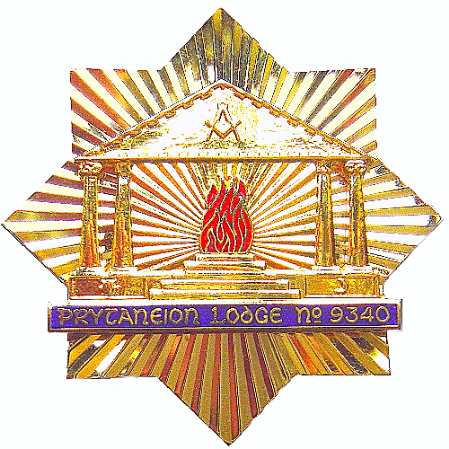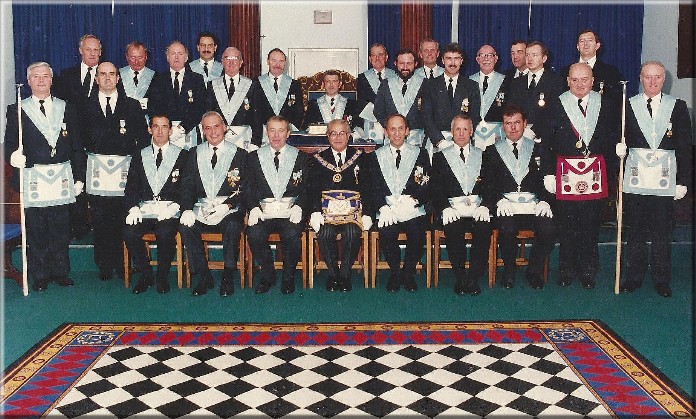About Us
Consecrated on the 6th October 1989, Prytaneion Lodge was originally formed by serving members of the then Hampshire Fire Brigade. Not wishing to bar non-serving men from membership, the Lodge also welcomed members from all professions.
An explanation of the Prytanes from which Prytaneion Lodge takes its name :
Human culture may be said to have begun with fire, of which the uses increased in the same ratio as culture itself. The Egyptians had a fire in every temple. The Greeks, Latins and Persians, in all towns and villages. The Natchez, Mayas and Peruvians had their national fires burning on tall strictures called pyramids. Of these fires the ‘eternal lamps’ in Synagogues and in the Byzantine and Catholic Churches may be a survival.
The ‘Regia’, Rome’s sacred centre and the abode of Vesta stood close to a Fountain; it was convenient to draw from the same spot the two great requisites fire and water. All civil and political interests group themselves round the Prytaneion, which was at once a temple, a town hall and a gossiping resort. All public and most private business was conducted around the warmth and light of the common fire. Thus the Prytaneion grew into a great institution.
We have curious and concordant testimonies that the principal functions of the state itself grew out of the care that was bestowed on tribal fire. The men who attended it in Hellas were called the Prytanes, They had to eat together and it would have been regarded as a bad omen had they neglected their duty.
The Prytanes were subsisted from public funds and when Hellas became established as a city they became ‘Archontes’ or magistrates and even ‘Basileis’, a combination of the military ruler and priest and king. Thus the guardians of the first tribal fire were the earliest public servants who, by degrees, were appointed to serve in all important offices, as the state developed into vast aggregate of interests.
When Augustus usurped the Roman Empire, he assumed all the powers of the ‘Pristine Board of Flamens’ or Prytanes. He made himself Pontifex Maximus and then assumed the charge of the public fire and when he wished to transport the fire to his own palace he had to make the palace public property. The Prytaneion and the state were convertible terms, if by chance the fire in the temple of Vesta was extinguished, all tribunals, all authority, all public and private business ceased immediately. The connection between Heaven and Earth was believed to have been broken and it had to be restored in some way, either by Jove sending down a divine lightning or by a sacred ceremony of the Prytanes, which used the heat generated by the rubbing together of two pieces of wood. No Greek or Roman army crossed their frontier without carrying an altar where the eternal fire taken from the Prytaneion burned night and day.
Lingering customs take us back to the time when every hearth was an altar and from the national Prytaneion, a brand was given to each Gens. When Gentes grew out of the tribe and subsequently when families grew out of the Gentes, coals were given from the Gentiles sacrificial stone to every family,
These three social organisms; the Nation, the Gens and the Family, one merging into the other, had fire for their common symbol and esteemed it as even the cause of their existence. The hearth was the very centre of the house, as the Regia was the sacred centre of Rome and the Roman Commonwealth. Around the Regia the civic and political institutions developed as around the hearth the family grew slowly into shape and power.
The Prytaneion was and is still considered as the birthplace of the genius of the Roman Commonwealth and the abode of the nations heroic ancestors.
As Prytaneion Lodge was originally formed for and by serving members of the Hampshire Fire Brigade, the name Prytaneion was considered as being synonymous with the occupations both professional and Masonic of the Founders.

"What we do in life, echoes in eternity."
At Prytaneion Lodge, we celebrate stories of good men making a positive difference in the world in general and Masonry in particular. So, it made sense for us to compile this website to celebrate the qualities of a good man.
Remember: No one person can have every good quality — but every person does have some good qualities. Freemasonry gives an opportunity and an obligation to continue to grow and improve ourselves. Like Maya Angelou said, “Do the best you can until you know better. Then when you know better, do better.” We subscribe to that.

The Lodge Founding Members. This picture was taken after the inaugural Meeting on the 6th October 1989, not in our current home but in the Botley Masonic Centre where the lodge was consecrated. The ceremony of Consecration was carried out by James Edward Bullen, Provincial Grand Master.
People
Freemasonry welcomes men of every country, religion, race, age, income, education, and opinion. However, to join Freemasonry and in order to preserve the qualities of our Order, one must meet the following qualifications:
Ready to begin your Masonic Journey? Contact the Secretary.
- Be a male at least 18 years of age (the minimum age varies in some jurisdictions, sometimes up to 21)
- Believe in the existence of a Supreme Being, although Freemasonry is not concerned with theological distinctions or particular religious beliefs
- Be of good moral character
- Be motivated to join for reasons unrelated to personal gain or profit
- Your decision to apply is based on your own “free will and accord”
- Be prompted by a pre-conceived, favorable opinion of Freemasonry
- Be desirous of earning knowledge and willing to conform to the ancient usages and customs of the fraternity